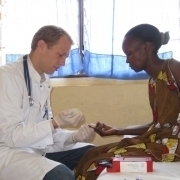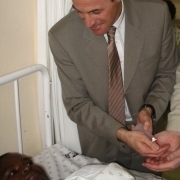Highly promising Ebola vaccine, developed with Austrian participation, goes into phase II
Research projects to prevent and cure the Ebola virus run at full speed. Among the most promising vaccines is a live vaccine, based on the Vesicular Stomatitis Virus (VSV). Univ.-Prof. Dr. Michael Ramharter from the MedUni Vienna is one of the researches developing this new vaccine. Until now Ebola has killed more than 10.000 people […]

 Carola Timmel
Carola Timmel
 Carola Timmel
Carola Timmel Carola Timmel
Carola Timmel Carola Timmel
Carola Timmel Carola Timmel
Carola Timmel Carola Timmel
Carola Timmel Carola Timmel
Carola Timmel Carola Timmel
Carola Timmel